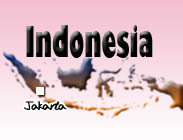Indonesia presidential hopefuls vie over economic promises By Sukino Harisumarto
 Jakarta - Indonesia's presidential election campaign is focused directly on the economy, with the three candidates competing to convince voters of their ability to handle welfare, jobs and poverty.
Jakarta - Indonesia's presidential election campaign is focused directly on the economy, with the three candidates competing to convince voters of their ability to handle welfare, jobs and poverty.
Since the downfall of autocrat Suharto's so-called "New Order" regime, reforms have brought many changes in the world's fourth most-populous nation, but the question remains whether it has managed to transform the government into prioritizing people first.
With more than 176 million voters eligible to vote for a new president in less than three weeks, candidates were working hard to discredit each other in a contest over "business-friendly" versus "people-friendly" economic policies.
All candidates - incumbent Susilo Bambang Yudhoyono, Vice-President Jusuf Kalla and former president Megawati Sukarnoputri - are aware that the main issues are poverty, unemployment and corruption.
Immediately after public campaigning began June 11, the three rivals fanned out across the country to deliver their promises, and chide each other.
Yudhoyono, enjoying broad support for his anti-corruption drive and presiding over an economy expanding despite the global slowdown, pledged to continue his economic policies if re-elected.
The selection of former central bank governor Boediono as his running mate sparked criticism from economic circles and rival candidates, who accused Yudhoyono of "neoliberal" economic policies favouring foreigners at the expense of the rural and urban poor.
Under a banner of "Lanjutkan" or "Continue," Yudhoyono attempted to dispel charges that not everyone enjoyed the economic growth under his administration.
"We do not espouse neoliberalism. We do not follow the Washington consensus," Yudhoyono said. "Many people talk about neoliberalism but they don't understand what it means."
"We have carried out strategic economic development that is pro-growth, pro-employment and pro-poor," the president said.
Indonesia is a standout economic performer in South-East Asia. While its neighbours, including Singapore, Thailand and Malaysia, are all going backwards, Indonesia looks to have weathered the global financial downturn.
Employing the campaign slogan "people's economy," Megawati - the daughter of the country's founding father Sukarno - and her running mate Prabowo Subianto outlined and ambitious target of 10-per-cent economic growth, a rate the country has never reached.
By contrast, Yudhoyono, who is heavily tipped by several pollsters to win a second term, is aiming for the more conservative target of 7 per cent of growth per year through 2014, while Kalla promises 8 per cent.
After kicking off the campaign at a garbage dump just outside Jakarta, Prabowo, a former commander of the army's Kopassus elite forces unit, is running on a strong populist economic agenda designed to appeal to the country's poor.
"I'm not against the free market, but our economic system is just too liberal. This system must be changed," Megawati's running mate said, arguing that for too long the nation's agriculture sector has been downtrodden by a focus on big business.
Prabowo has been dogged by controversy over alleged human rights abuses, but many Indonesians - who live on less than 2 dollars a day - have short memories and are more concerned about day-to-day economic circumstances than human rights.
Megawati and Prabowo vowed to intensify development in agriculture, with a pledge to set aside 2 million hectares of land for rice, corn, soya and sugarcane to create 12 million jobs.
Running under a campaign motto, "The faster, the better," president hopeful Jusuf Kalla and running mate Wiranto offered independent, nationalist economic policies instead of helping large capitalists.
"We are seriously committed to developing a fair and self-reliant community," the incumbent vice president said. "Don't simply rely on foreign aid. We can do it alone and I believe we can."
"The people should be fully involved in the economy, the number of traditional markets should be increased and used to sustain the national economy."
But as a businessman, Kalla tends to side with big business and he would be likely to hold to some neoliberal economic policies.
Traders are faulting the government for allowing hypermarkets to to sprout across the country, claiming that such a decision means "killing" the traditional markets central to the life of the average Indonesians.
"From day-to-day, our trading volumes have been declining lately. Most buyers turned to hypermarkets because they were often offering a discount price," said Samino, 55, a trader at a traditional market in the eastern Jakarta suburb of Jatinegara.
Some economists say all three candidates are centrist and nationalist, with real agendas that are not much different.
"All of our country's ongoing economic policies are based on the philosophy of liberalism that praises free markets," said economist Revrisond Baswir from the Gajah Mada University, in the central Java city of Yogyakarta.
Many voters remain sceptical of campaign pledges.
"I have been poor all of my life no matter who the president is," said Gandung Hartono, a father of four. "I am tired and bored of all of the candidates' promises. It is just lip service and after being elected, he or she will forget the promises." (dpa)